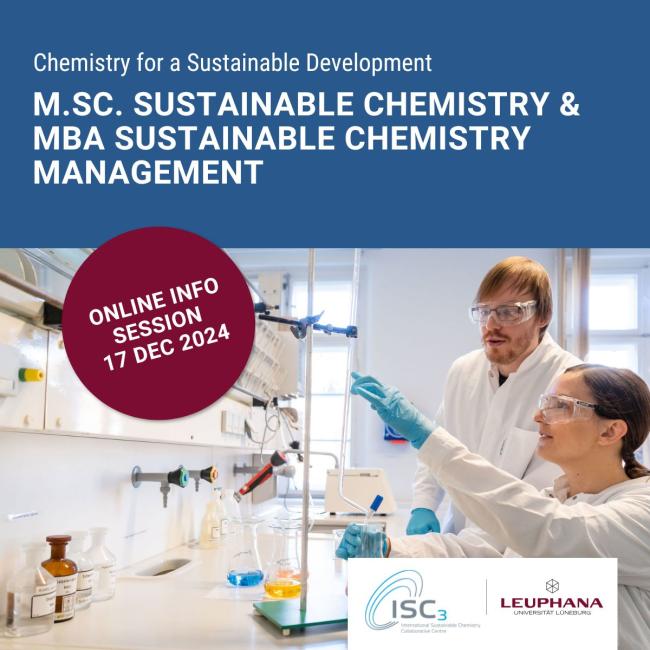Sustainable Chemistry
Primary tabs
Project Manager/Director - Innovation & Sustainability - the International Sustainable Chemistry Collaborative Centre (ISC3)
The "International Sustainable Chemistry Collaborative Centre" (ISC3) is managed by Deutsche Gesellschaft für Internationale Zusammenarbeit (GIZ) on behalf of the Federal Ministry for the Environment, Nature Conservation, Nuclear Safety and Consumer Protection BMUV and the German Environment Agency UBA.
Leuphana University - MSc & MBA Sustainable Chemistry - Online Information Event

Event Description
An exclusive online event on December 17, 2024, at 5:00 p.m. Central European Time (11:00 am Eastern Time).
Designed for professionals in the chemical sector, these programs equip you to lead the transition toward sustainable practices while advancing your career. Our programs are delivered primarily online, in English, offering maximum flexibility to balance your studies with professional and personal commitments.
At the event, you'll have the chance to learn about the unique curriculum, which integrates insights from international experts across academia, industry, and government. A special highlight of the session is a talk by Professor Klaus Kümmerer, a globally renowned scientist in sustainable chemistry. He will share his vision for sustainability's critical role in the chemical industry and explain how these programs prepare participants to be pioneers in this transformative field.
Take the first step towards making a meaningful impact in the chemical sector. Join us to learn how Leuphana University's postgraduate programs can help you stand out and shape the future of chemistry.
United States
Junior or Full Professorship in Sustainable Chemistry
2024-10-30 THE SCHOOL OF SUSTAINABILITY AT LEUPHANA UNIVERSITY LÜNEBURG INVITES APPLICATIONS FOR THE FOLLOWING JUNIOR PROFESSORSHIP WITH TENURE TRACK OR FULL PROFESSORSHIP:
Sustainable Chemistry (Open Rank: W1 with tenure track leading to W2 or W2)
Formulations Chemist
JOB TITLE: Formulations Chemist
REPORTS TO: Laboratory Manager
STATUS: Full time, non-exempt
LOCATION: Bellingham, WA (on-site)
SALARY RANGE: $80,000 – $90,000/year based on interview outcome and experience
Assistant Professor, Department of Chemical Sciences
Department Summary
CIC Green Division's Inaugural Annual General Meeting (AGM)
Event Description
We are excited to announce that the Chemical Institute of Canada (CIC) has created the CIC Green Subject Division. Its objective is to bring together the community of researchers and practitioners of the Canadian Society for Chemistry (CSC) and Canadian Society for Chemical Engineering (CSChE) who identify as contributing to, or having an interest in, green chemistry and chemical engineering.
The new Green Subject Division will:
- Organize symposia on green and sustainable chemistry, technology, and chemical engineering at the annual CSC and CSChE conferences.
- Bolster industrial participation at the annual CSC and CSChE conferences.
- Provide professional training in green/sustainable practices at the annual CSC and CSChE conferences.
- Present Canadian Green Chemistry and Engineering Awards.
- …and further activities that will serve our community.
*Save the date*
The Green Division's inaugural Annual General Meeting (AGM) will be held by Zoom on Tuesday, Jun.18 at 1 PM ET.
Join Zoom Meeting
Meeting ID: 850 7250 8961
Passcode: 871250
The AGM can be accessed via the Green Division Webpage.
Positions of leadership are open! At the AGM, we will elect a Division Chair, Division Vice-Chair, and Division Secretary-Treasurer as well as up to six (6) Division Members at Large. If you or someone you know would be interested, please ask them to communicate with Joelle Pelletier at joelle.pelletier@umontreal.ca. Spread the news to your research group and colleagues!
If you will attend CSC 2024 in Winnipeg, we will also be holding an Information Session on Tuesday June 4 from 5:20 to 7:20 (Central Time) in Room 9. Please drop by, learn more and get involved. All those interested in green and sustainable chemistry, technology and chemical engineering are welcome, including students and postdocs: we invite all to contribute to shaping the new Green Subject Division.
We look forward to working with you to make the CIC Green Subject Division part of our future.
United States
Pagination
- Page 1
- Next page